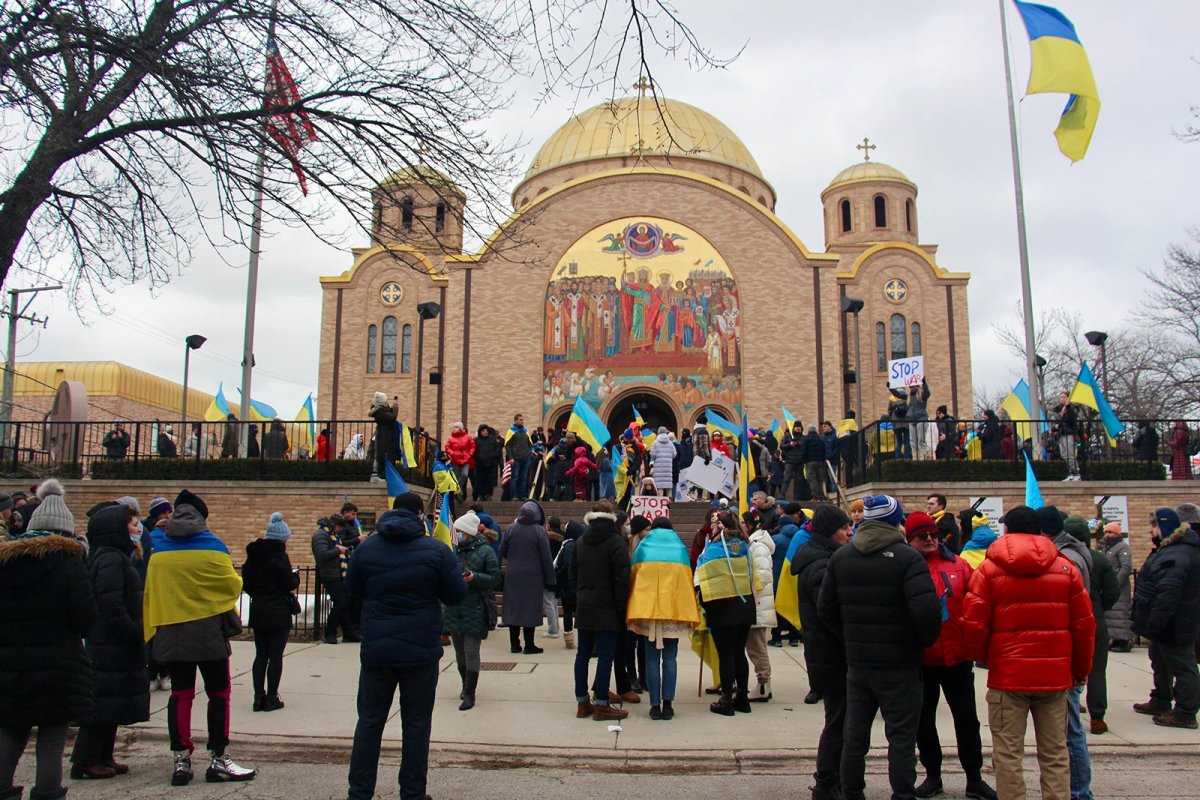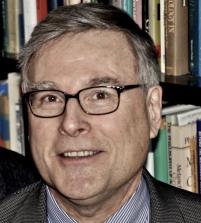
Ukraine: Religion In Plain Sight?
When gods and kings are too closely aligned, religion becomes an engine of discord and war.
Blindness and insight, concealed and revealed, truth and illusion—these are some of the paradoxes religions often explore. Many religious traditions suggest that there are truths which one can immediately recognize, but only after a process of having one’s perception transformed. In the Bhagavad Gita Arjuna must have his eyes opened to the battle he is witnessing to finally "see" that atman and brahman are really one.[1] A Zen koan is meant, through mediation, to replace reasoning with instant insight. Christian theologian Søren Kierkegaard claims that the appearance of the God-Man in a wandering teacher conceals even if, with eyes to see, this one is the Christ. In Islam, the Qur’an says that it is not blindness of the eyes but of the heart that is truly blindness (Quran 22:46).
Analogous paradoxes are found with sightings of religion in public life. Sometimes they hide under the surface and outlets like Sightings seek to reveal them. At other times, religion is plainly manifest among us, and scholars and columnists must explore it. And yet there are times when religion is revealed and concealed by the same events. With the conflict in Ukraine raging, religion is in plain sight, and in profound ways, but religion is also concealed by the fog of war. Let's work through layers of religion revealed and concealed within the horror of what is happening in Ukraine.
§1
A recent article in the Washington Post noted that "Ukrainian churches in the United States have been filled with Americans of all faiths—and some who have no religious affiliation—in a show of support for and solidarity with the besieged nation." Secretary of State Antony Blinken, the article notes, went to the "Ukrainian Catholic National Shrine of the Holy Family in Washington to light a candle," saying " “It’s in the most difficult moments that our faith is tested."[2] In fact, all over the country there has been an outpouring of support for Ukraine even while worries about the safety of Russian Americans is on the rise. Religion is being publicly revealed, obviously. How is it concealed in the same events? Here we need a bit of a theory of religion in order to ferret out religion concealed.
In the Social Contract, Jean-Jacques Rousseau wrote this: “At first men had no kings but the Gods, and their only government was theocratic.... From this simple fact, that a God was placed at the head of every political society, it follows that there were as many Gods as peoples." Rousseau's point is that religion functions to bring identity and unity to a political society. For him, this was a form of faith, a civil faith, formulated by the sovereign, that was to cultivate "sentiments of sociability, without which it is impossible to be either a good citizen or loyal subject."[3] From these thoughts we get contemporary ideas of "civil religion" examined by sociologists, theologians, and students of religion and politics.
I am not suggesting that Mr. Blinken or the many people filling Ukrainian churches are necessarily practicing some form of civil religion, of which there are many, or that their expressions of religious solidarity are merely political actions in disguise. The point is that religion, as a sentiment of sociability, both unites people, but also, like the ancient gods, divides people into tribes. Two points then connect: religion is concealed and revealed in public life and when gods and kings are too closely aligned in the quest for sovereign power, religion easily becomes, wittingly or not, the engine of discord and even war. Rousseau apparently did not consider any good transcendent of political society, and that, as we'll see, might precisely be the issue. What seems obvious in the days, now weeks, following the conflict in Ukraine, is that religion can unite people from different walks of life but also too easily conceals its power to fuel conflict.
§2
Religion is both revealed and concealed in the situation unfolding in Ukraine amid a struggle for sovereignty. As many might know, Orthodox Christians think about the relation of Church and State, religion and politics, as a symphonia (Greek: συμφωνία "accord"). This accord is to be characterized by mutual respect and complimentarity between Church and State where neither seeks to dominate the other. It is not quite a separation of Church and State nor is it a State Church, in any precise sense of those terms. It marks out a distinct way to relate the political and ecclesial orders.
Historically, symphonia has been a concept fraught with ambiguity. In the present situation, the head of the US Ukrainian Orthodox Church criticized Patriarch Kirill of Moscow as supporting Putin. And Putin, the US church claimed, is making the conflict into a religious war. The drive towards Kyiv is not only to enfold Ukraine into Russia, but also to reclaim the history of Vladimir the Great (956–1015) who converted to Christianity and was Prince of all Russia. The more immediate background, as the Religion News Service reports, is that in "late 2018 and early 2019, Orthodox Christians in Ukraine declared independence, or autocephaly, from the Orthodox Patriarchate in Russia. The Orthodox Church in Constantinople promptly set about recognizing the independence of the Ukrainian Orthodox Church, while Russian Orthodox leaders refused."[4] Matters are extremely complex, to say the least. Religion, revealed or concealed, is entangled with matters of sovereignty.
Not only different religions (civil or otherwise), but one form of Christianity diversified in itself (as all forms of Christianity are), drives both unity and possible conflict. Now, the conflict is readily reported. Where is the unity? Importantly, Bartholomew, the Archbishop of Constantinople‐New Rome and Ecumenical Patriarch (the so-called Green Patriarch) commissioned and then approved a text now titled For the Life of the World: Towards A Social Ethos of the Orthodox Church.[5] This followed from decisions made at the Holy and Great Council convened in Crete (2020) aimed at the Unity of the Orthodox. For the Life of the World is a beautiful, profound, and erudite text that sets forth a social vision for the Orthodox communion structure by the Divine Liturgy. At the core of the text is the affirmation that the human person has "been created in the image and likeness of God. To be made in God's image is to be made free and conscious of communion and union with God in Jesus Christ inasmuch as we are formed in, and through, and for him."[6] Any action or government that makes people into the means for the conduct of an unjustified war cannot claim religious sanction. The same is true of social, racial, sexual, economic, and ecological violence.
§3
A final layer of reflection is now opened to us. Concealed between the covers of this volume on the Orthodox social ethos is a bold affirmation of the inviolable good of human dignity, nature, and the created order that ought not be used to sanction unjust violent conflict. This is a good that transcends the sentiments of sociability esteemed by Rousseau. To be sure, Orthodox believers ground that good in a transcendent and living God and the Church as an icon of God. This sighting of religion is one that can and should keep civil religion civil rather than belligerent, a sighting not just for the State, but for Churches as well. However, the insight is not that everyone needs to be Christian or Orthodox or hold any religious convictions at all. The insight was seemingly grasped by those folks without religious affiliation who showed up to fill the pews at Ukrainian churches. It is the insight that social institutions, including political and religious ones, must serve a good beyond their own quest for sovereignty if there is to be any legitimate sovereignty at all.
Image: Pro-Ukraine demonstrators rally outside the Sts. Volodymyr and Olha Ukrainian Catholic Church in Chicago's Ukrainian Village neighborhood, Thursday, Feb. 24, 2022. Photo from Religion New Service by Emily McFarlan Miller.
[1] For a further discussion see William Schweiker and David A. Clairmont, Religious Ethics: Meaning and Method (Wiley-Blackwell, 2020).
[2] https://www.washingtonpost.com/lifestyle/2022/03/08/ukraine-churches-solidarity-war/.
[3] Rousseau: The Social Contract and Other Later Political Writings, trans. V. Gourevitch (Cambridge University Press, 2018), Bk IV, Ch 8.
[4] religionnews.com/2022/02/25/a-religious-politician-head-of-ukrainian-orthodox-church-of-the-usa-slams-patriarch-kirill-putin/
[5] Earlier in February of this year, just days before the conflict in Ukraine started, a conference was held, sponsored by the University of Chicago Divinity School's Martin Marty Center, the Lumen Christi Institute, and The Fordham Center for Orthodox Christian Studies on For the Life of the World. I was honored to respond to the text from a Protestant perspective and so too was a Catholic and a Coptic Christian response given. The text has generated varied responses from around the world.
[6] David B. Hart and John Chryssavgis, eds. For the Life of the World: Toward a Social Ethos of the Orthodox Church (Brookline, MA: Holy Cross Orthodox Press, 2020), §1.


